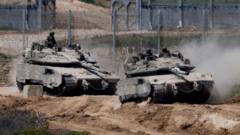In a decisive move, Israel's security cabinet has approved plans to intensify its military efforts in Gaza to capture and hold territory while aiming to increase pressure on Hamas. Amid ongoing humanitarian crises and international scrutiny, the military cites the need for enhanced operations to secure the release of hostages. Criticism mounts over potential risks to civilian safety and humanitarian principles.
Israel's Security Cabinet Greenlights Expanded Military Offensive in Gaza

Israel's Security Cabinet Greenlights Expanded Military Offensive in Gaza
The Israeli government has approved a strategic escalation of its offensive against Hamas, focusing on territorial control in Gaza, as tens of thousands of reservists are mobilized for the operation.
Israel's military has taken significant steps to ramp up its offensive against Hamas, following a unanimous agreement from its security cabinet to expand operations in Gaza. This comes as tens of thousands of reservists have been called up, signaling a shift towards capturing and holding territory in the area, as part of a broader strategy to enhance negotiations for hostage releases and ceasefires.
The plans reportedly focus on creating a "sustained Israeli presence" in Gaza, as Prime Minister Benjamin Netanyahu aims to differentiate this military escalation from previous operations. Officials emphasize the necessity of increasing pressure on Hamas, which has held over 59 hostages since the escalation began. Nonetheless, critics argue that this strategy diverts attention from the urgent need to secure the safety of the hostages, with families of the victims expressing concern that territorial gains are being prioritized over lives.
Ahead of US President Donald Trump's anticipated visit, the cabinet has also approved a controversial proposal to resume limited humanitarian aid through private companies. This comes after a two-month blockade that has led to severe food shortages in Gaza, with the United Nations and various aid organizations warning that the plan violates basic humanitarian principles by potentially allowing for military control over essential supplies.
The Humanitarian Country Team (HCT) criticized the Israeli government's strategy, suggesting it would further endanger vulnerable populations and threaten humanitarian workers' safety. Despite Israel's assertions that it complies with international law concerning aid, the UN emphasizes its obligations to assist the 2.1 million Palestinians in Gaza who are facing dire conditions.
As hostilities persist, Israel's ongoing military campaign follows unprecedented cross-border attacks by Hamas on October 7, resulting in significant casualties and an increase in tensions throughout the region, which underscore the complexity and urgency of the situation.
The plans reportedly focus on creating a "sustained Israeli presence" in Gaza, as Prime Minister Benjamin Netanyahu aims to differentiate this military escalation from previous operations. Officials emphasize the necessity of increasing pressure on Hamas, which has held over 59 hostages since the escalation began. Nonetheless, critics argue that this strategy diverts attention from the urgent need to secure the safety of the hostages, with families of the victims expressing concern that territorial gains are being prioritized over lives.
Ahead of US President Donald Trump's anticipated visit, the cabinet has also approved a controversial proposal to resume limited humanitarian aid through private companies. This comes after a two-month blockade that has led to severe food shortages in Gaza, with the United Nations and various aid organizations warning that the plan violates basic humanitarian principles by potentially allowing for military control over essential supplies.
The Humanitarian Country Team (HCT) criticized the Israeli government's strategy, suggesting it would further endanger vulnerable populations and threaten humanitarian workers' safety. Despite Israel's assertions that it complies with international law concerning aid, the UN emphasizes its obligations to assist the 2.1 million Palestinians in Gaza who are facing dire conditions.
As hostilities persist, Israel's ongoing military campaign follows unprecedented cross-border attacks by Hamas on October 7, resulting in significant casualties and an increase in tensions throughout the region, which underscore the complexity and urgency of the situation.




















